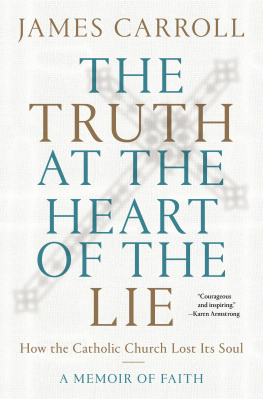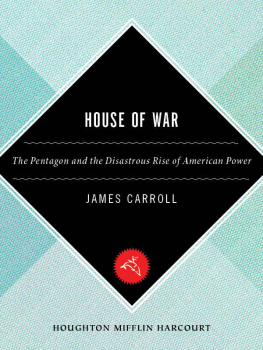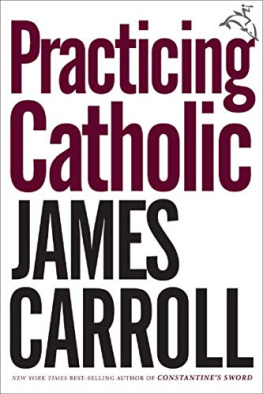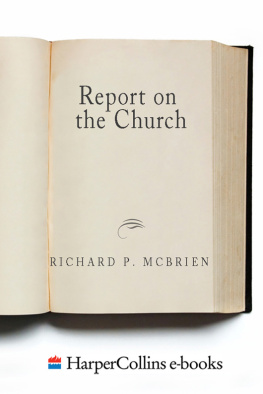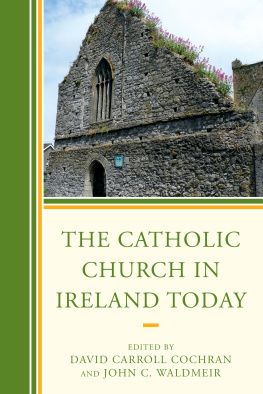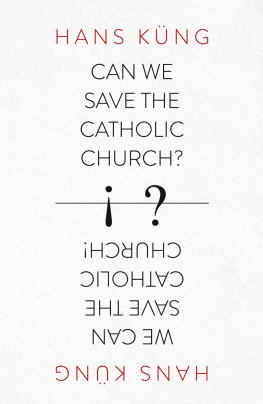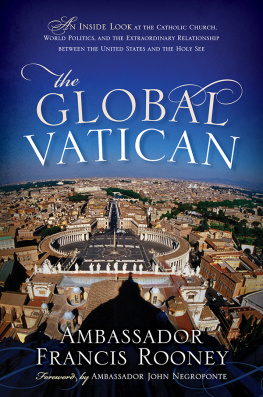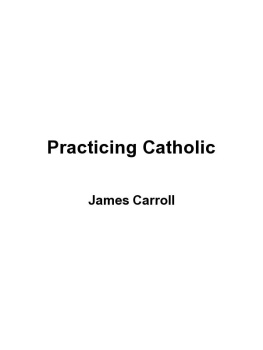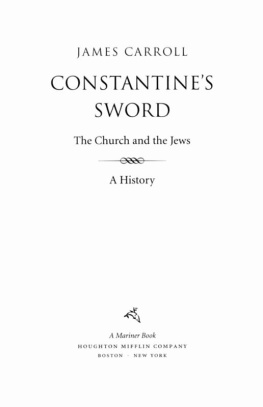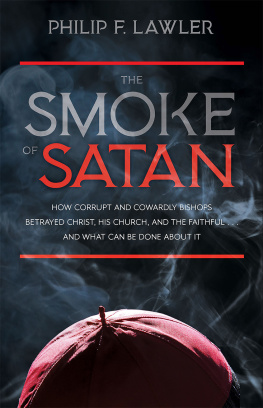A MARINER BOOK
Houghton Mifflin Company
BOSTON NEW YORK
2002
Copyright 2002 by James Carroll
All rights reserved
For information about permission to reproduce selections
from this book, write to Permissions, Houghton Mifflin Company,
215 Park Avenue South, New York, New York 10003.
Visit our Web site: www.houghtonmifflinbooks.com.
Library of Congress Cataloging-in-Publication Data
Carroll, James, date.
Toward a new Catholic Church : the promise
of reform / James Carroll,
p. cm.
Includes bibliographical references.
ISBN 0-618-31337-0
1. Catholic ChurchDoctrines. I. Title.
BX 1751.3 . C 37 2002
282'.09'0511dc21
2002027262
Printed in the United States of America
QUM 10 9 8 7 6 5 4 3 2 1
Author's Note
Parts of chapter one appeared, in somewhat different form, in the Boston Globe and Daedalus. Material from chapters one through six is adapted from my book Constantine's Sword. I gratefully acknowledge my editors: Rene Loth, Robert Turner, and Marjorie Pritchard at the Globe; James Miller at Daedalus; Wendy Strothman, Eric Chinski, and Larry Cooper at Houghton Mifflin. And loving thanks to Alexandra Marshall, my wife, who encouraged this project from the start.
For Daniel Berrigan, S.J.
and for James Parks Morton
It is not that the Gospel has changed: it is that we have begun to understand it better ... and know that the moment has come to discern the signs of the times, to seize the opportunity and to look far ahead.
John XXIII
Contents
1 What Is to Be Done?
2 The Broad Relevance of Catholic Reform
3 Reform Proposal 1: A New Biblical Literacy
4 Reform Proposal 2: The Church and Power
5 Reform Proposal 3: A New Christology
6 Reform Proposal 4: The Holiness of Democracy
7 Reform Proposal 5: Repentance
Notes
1. What Is to Be Done?
I T WAS January of 2001 when I published Constantine's Sword: The Church and the Jews, but the twenty-first century had not really begun. Politics and religion were central to that book's consideration of Christian antisemitism, but the meaning of politics and religion both were transformed by the event that marked the new era's true beginning, which was, of course, September 11. A savage act of violence was committed in the name of Allah. America's consequent War on Terrorism, inadvertently labeled a "crusade" by President George W. Bush, is being waged with a good-versus-evil religious fervor. As with Bush, absolutism has newly gripped world leaders, especially in the tinderboxes of the Middle East, on the Indian subcontinent, and in central Asia. Challenged by these unsettling developments, religious people everywhere have undertaken an urgent new examination of the relationship between variously held beliefs and their effects on those who do not share them.
We Americans have discovered with something approaching astonishment the wild diversity of religious and spiritual impulses that has come to mark not only the planet but our own nation. "Today," as the great Catholic theologian Karl Rahner put it, "everyone is the next-door neighbor and spiritual neighbor of everyone else in the world." And as Rahner argues, even from within Catholicism, this new circumstance means the assumptions of every religion must now be the subject of reexamination.
Ideological and religious elbow-rubbing is a global phenomenon, but it occurs in the United States as nowhere else. As a nation that welcomes an unending stream of immigrants, with their plethora of faiths and traditions, America implicitly sponsors this reexamination, as religiously diverse peoples encounter each other in the mundane "neighborhoods" of work, school, and living. The testing of assumptions that inevitably follows is one of the reasons America is suspect in the eyes of rigidly traditional societies.
After September 11, the Islamic presence in America drew particular attention, and the still dominant assumption of the mainly Christian, or "Judeo-Christian," character of the nation was punctured. Americans discovered that there were more Muslims living among them than Presbyterians or Episcopalians, and as many Muslims as Jews. Suddenly, with Islam, on one side, being perceived as a religion that sponsors violence, and with God, on the other, being invoked as "blessing" America's War on Terrorism, religious differences as such loomed as flashpoints in the nation's life.
Meanwhile, across the globe, fundamentalist truth-claims, rooted in various religions, were seen to be fueling conflicts with ferocious new energy. In the Arab world, and in Europe, there was a virulent outbreak of the old scourge of anti-semitism, with some Muslims believing that the September 11 atrocities were the work of Jews, and with some in the West inclined to accept Osama bin Laden's deadly equation between the existence of Israel and the misery of impoverished Arabs. Ariel Sharon, meanwhile, surfaced as an antisemite's dream, with few of his critics seeing his "overwhelming force" escalations against the Palestinians in the context of America's sanctioning. After all, "overwhelming force" was the mode of America's war in Afghanistan, the full costs of which have yet to be tallied. Likewise, Israel's critics have painted with the old broad brush, drawing few distinctions between the Israeli government's belligerence and the segments of Israeli society that continued to support the ideal of peace. Some drew moral equivalence between the Israel Defense Forces and Hamas, or condemned IDF incursions into Bethlehem, for example, while saying nothing about a Seder massacre in Jerusalem. Once again a stereotyped and univocal fantasy of "the Jews" was broadly seen as a problem to the world.
Hannah Arendt, the Jewish political philosopher of the mid-twentieth century, warned of the doom that follows from the idea of "eternal antisemitism," as if Jews were fated to play the victim's role. As the War on Terrorism unfolded, some reduced all of Islam to the idea of an "eternal jihad," as if the "clash of civilizations," in Samuel Huntington's phrase, between Islam and the rest of the world were inevitable. As bigoted stereotypes of Jews and their religion once more entered the common discourse, wildly distorted characterizations of Muslim belief and practice were accepted as fact. The religions of both groups were understood as motivating behavior, whether approved or condemned, that had grave consequences for humanity.
All at once, the widely held twentieth-century assumption that religion would grow increasingly irrelevant seemed naive. The centrality of religion to life on earth, for better and for worse, had made itself very clear in a very short time. Yet never had the dark side of religion seemed more manifest, with various forms of what must be termed religious fascism being recognized as such. The Muslim suicide-murderers, wreaking such havoc in Israel, are religious fascists, certainly, but in hindsight it could be seen that so were the Catholic and Protestant fanatics of the die-hard fringes in Northern Ireland. The Hindu who assassinated Indira Gandhi was a religious fascist, and so was the Jewish student who murdered Yitzhak Rabin. What territorial compromise is possible among people who believe their claim to disputed land derives from God? What truce can interrupt violence that is held to be sacred, even if it is suicidal? Regarded across time, what religion seems free of such demonic impulses?
With numerous mainstream religions being challenged from within by their own fundamentalist extremists, and with expressly fundamentalist denominations ascendant over much of the world, the task of renewing the rational element in religion, historically minded and ecumenically disposed, has become more and more important. The capacity of each religion to engage in self-criticism and -correction has come to be seen as a compelling issue not only for the religions but for their neighbors, whose very lives may be put at risk. "There will be no peace among the nations," as the Swiss Catholic theologian Hans Kung put it, "without peace among the religions. There will be no peace among the religions without dialogue between the religions. There will be no dialogue between the religions without the investigation of the foundations of the religions."
Next page

